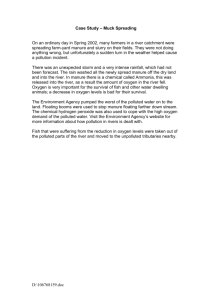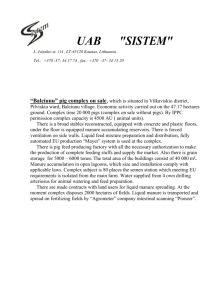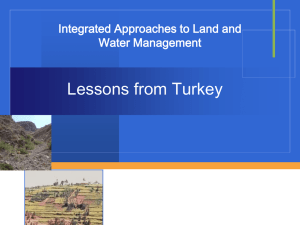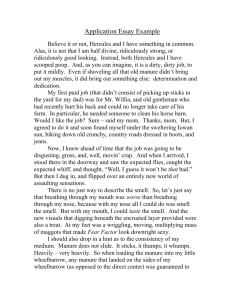Spreading Log The newsletter of the Professional Nutrient Applicators Association of Wisconsin
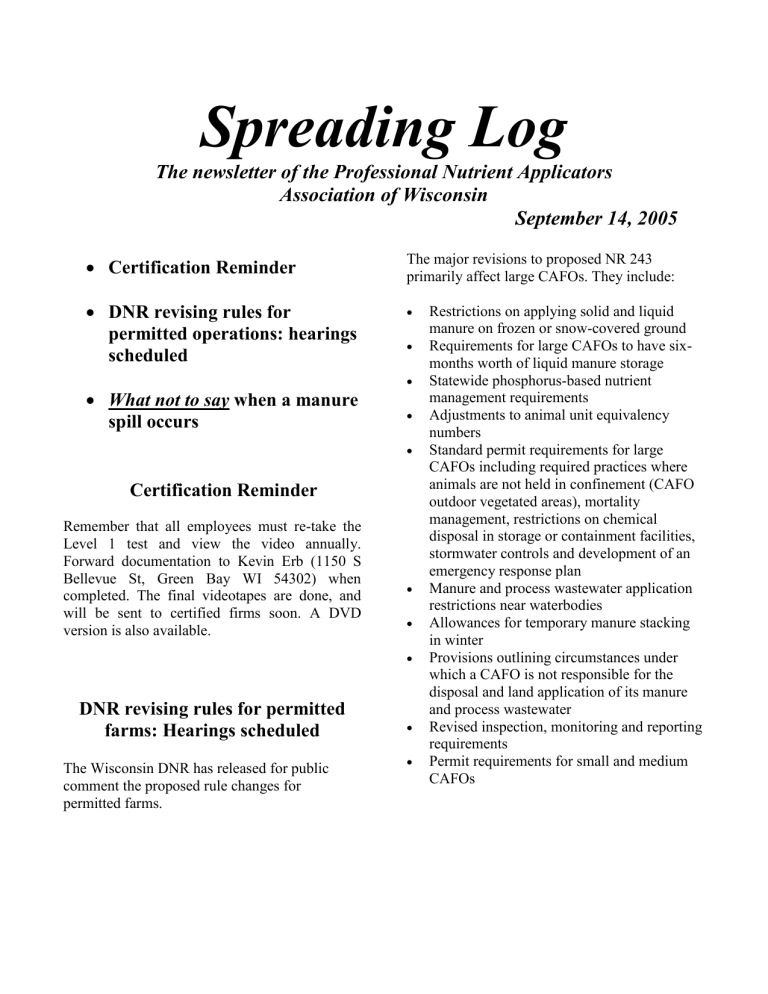
Spreading Log
The newsletter of the Professional Nutrient Applicators
Association of Wisconsin
September 14, 2005
Certification Reminder
DNR revising rules for permitted operations: hearings scheduled
What not to say when a manure spill occurs
Certification Reminder
Remember that all employees must re-take the
Level 1 test and view the video annually.
Forward documentation to Kevin Erb (1150 S
Bellevue St, Green Bay WI 54302) when completed. The final videotapes are done, and will be sent to certified firms soon. A DVD version is also available.
DNR revising rules for permitted farms: Hearings scheduled
The Wisconsin DNR has released for public comment the proposed rule changes for permitted farms.
The major revisions to proposed NR 243 primarily affect large CAFOs. They include:
Restrictions on applying solid and liquid manure on frozen or snow-covered ground
Requirements for large CAFOs to have sixmonths worth of liquid manure storage
Statewide phosphorus-based nutrient management requirements
Adjustments to animal unit equivalency
numbers
Standard permit requirements for large
CAFOs including required practices where animals are not held in confinement (CAFO outdoor vegetated areas), mortality management, restrictions on chemical disposal in storage or containment facilities, stormwater controls and development of an emergency response plan
Manure and process wastewater application
restrictions near waterbodies
Allowances for temporary manure stacking
in winter
Provisions outlining circumstances under which a CAFO is not responsible for the disposal and land application of its manure and process wastewater
Revised inspection, monitoring and reporting requirements
Permit requirements for small and medium
CAFOs
A set of 8 public meetings on the proposed revisions will be held around the state. The dates/times are as follows:
September 20, Menomonie , Dunn County
Agricultural Center, 390 Red Cedar St., 1 - 3 p.m. and 7:30-9:30 p.m.
September 21, Marshfield
– 1-3 p.m. and
7:30 -9:30 p.m., Marshfield Agricultural
Research Station, 8396 Yellowstone Dr.
September 28, Madison – 12:45-2:45 p.m. and 7:30-9:30 p.m., Lyman F. Anderson
Agriculture & Conservation Center, 1 Fen Oak
Ct., Rooms A and B.
September 29, Appleton – 1-3 p.m. and 7:30
-9:30 p.m. Outagamie County Land
Conservation Department, 3365 W. Brewster St.,
Rooms A, B & C
If you are unable to make the meetings, you may view the information at http://dnr.wi.gov/org/water/wm/nps/rules/nr243/ nr243.htm
. Written comments on the proposed rule may be submitted via U.S. mail to:
Tom Bauman
Bureau of Watershed Management
P.O. Box 7921
Madison, WI 53707
What NOT TO SAY when a manure runoff incident happens.
Think about how this applies to a manure runoff or odor complaint from a neighbor.
From: Dairy Herd Management-Online
3 steps to restore public confidence
Europe has had to contend with various food scares, such as BSE, over the past decade. So,
David Byrne, former EU Commissioner for health and consumer protection, should have a good idea what it takes to restore public confidence. According to Byrne the consumer needs to know:
Someone is in charge.
There is a plan.
The plan is working.
Byrne spoke May 24 at Alltech s International
Feed Industry Symposium in Lexington, Ky.
... Yet some countries do it better than others
While the three steps to restoring consumer confidence seem pretty basic (see item above), some countries do a better job of it than others.
For example:
Great Britain had troubles with BSE in
1996. Scientists traced the problem to tainted meat and bone meal, and politicians imposed a national ban on that feed material. In this case, the public could see the actions taken to minimize risk, consumer confidence rose, and so did beef consumption.
Meanwhile, Germany fought a proposed ban of meat and bone meal within the
European Union. Its Minister of
Agriculture insisted there was no BSE in
Germany, even though scientists felt a future case was probable. Consumers were misled into thinking a problem or potential problem did not exist. Then, when BSE was found in a native-born cow in 2000, German consumption of beef plummeted to zero, said David
Byrne, former EU commissioner for food safety.
More information on David Byrne’s presentation is available at http://www.alltech.com/Symposium/index.ht
m .
